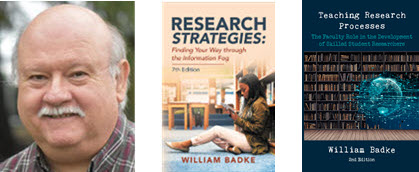
Teaching Resources

The following is a compilation of some of the resources I have created over the years.
I trust you will find them useful.
Online Course (Undergraduate)
Online Course (Graduate level)
Live Course Syllabus (Graduate level)
Rubrics for Live Course (Graduate)
Teaching Manual (Graduate)
For Students:
Scholarship and the Information World
No One Knows for Sure What Information is Anymore
Doing Research
Things We Might Believe about University Research
Research Questions: The Good and the Not So Good
Creating Preliminary Outlines from Research Questions
Plagiarism
For Instructors:
Student Alienation in the Information age
Our Students Don't Know How to Do Research
Student Research Ability: The Challenges
Pulling down Walls: Developing Students as Skilled Researchers
For Students:
A Model for the Process of Informational Research
Keywords from Research Questions
Plagiarism, Eh? How to Recognize it and Get it Out of your Life
Human Research Ethics: You want to do what with? With whom?
Master's Level Presentation: Persuasion and Effective Communication
For Instructors:
What Students Don't Know about Research
Moving Information Literacy into the Curriculum: The Challenges
Students as Researchers: The Faculty Role
Information Literacy: Problems and Insights
Disciplinary Thinking in Research Processes
Classroom Activities And Assignments
Papers ![]() [Note that citations to further papers can be found at http://williambadke.com/badke.htm.
[Note that citations to further papers can be found at http://williambadke.com/badke.htm.
"Can't Get No Respect: Helping Faculty to Understand the Educational Power of Information Literacy." The Reference Librarian 43, no. 89/90 (2005): 63-80. Also published inRelationships Between Teaching Faculty and Teaching Librarians: Do You Really Get More Flies with Honey? Binghampton, NY: Haworth Press, 2005, 63-80.
"A One Credit Prerequisite Model for Theological Information Literacy (Models for Information Literacy Panel)." American Theological Library Association Summary of Proceedings 59 (2005): 160-164.
"Associated Canadian Theological Schools: Building an Online Graduate Information Literacy Course Without a Blueprint." Public Services Quarterly 3 no.3/4 (2007): 19-35.
"What to Do with Wikipedia." Online 32, no. 2 (March-April 2008): 48-50.
"Why Information Literacy is Invisible." Communications in Information Literacy 4, no.2 (2010): 129-141.
"Student Theological Research as an Invitation." Theological Librarianship 5, no.1 (2012): 30-42.
"The Convenience Factor in Information Seeking." Online Searcher 38, no. 6 (November-December, 2014): 68-70.
"Expertise and Authority in an Age of Crowdsourcing," in Not Just Where to Click: Teaching Students How to Think about Information. Ed. Troy Swanson; Heather Jagman. Chicago: Association of College and Research Libraries, 2015.
Farrell, Robert and Badke, William. "Situating Information Literacy in the Disciplines: A Practical and Systematic Approach for Librarians." Reference Services Review 43, no.2 (2015): 319-340.
"The Framework for Information Literacy and Theological Education" Theological Librarianship 8, no. 2 (2015): 4-7.
"Post-Truth, False News, and Information Literacy." Online Searcher 41, no. 4 (July-August, 2017): 57-59.
A Model for Research Assignment Creation in the Context of Inquiry-based Learning
Writing Research Essays - A Guide for Students of All Nations
Guidelines for Development of an Online Information Literacy Course